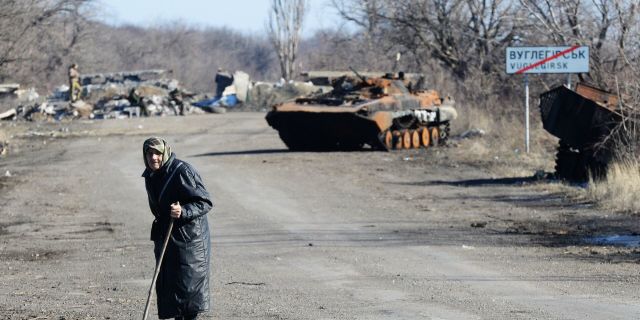TNI: The US and the EU should take the example of the partition of Cyprus to resolve the Ukrainian conflictThe West demands that Russia liberate Crimea and other occupied territories.
But at the time they did not object to the Turkish occupation of Cyprus, writes TNI. The author emphasizes that Ukraine and Cyprus are not the same thing, but "there are some similarities" that make it possible to resolve the current crisis.
Leon HadarOnce, the leaders of a powerful military power and the successor of a great empire, which lost most of its lands after the World War, became concerned about political instability and regime change in a neighboring country - one of its former provinces.
They were afraid that the changes would become a threat to the relatives living in the lost possessions. In addition, the leaders were afraid that a historical rival would take advantage of the situation and increase the military presence in the neighborhood.
Then, disregarding international law, the former empire brought troops into the country and occupied part of its territory under the pretext of saving compatriots and protecting its fundamental interests.
Having occupied more than a third of this country, the military declared these lands an autonomous region, and then an independent state. This step actually split the country, but it was not recognized by the international community — even the leading allies of the power itself.
This "independent state" has existed for half a century, and repeated diplomatic attempts to somehow unite the country have not been crowned with success. The illegal occupation, coupled with human rights violations, has become a cause for criticism, and the free part of the country has turned into a modern and prosperous liberal democracy.
The bottom line is that the status quo has remained unchanged and meets the interests of all stakeholders. And despite the illegal occupation, the nation-State, dreaming of restoring its former empire, has become a major regional and global player and maintains diplomatic relations with all members of the international community.
Of course, the above-mentioned aggressor country is not Russia, and the described situation is by no means the occupation of Ukraine and the events that led to it. On the contrary, this is the history of the island of Cyprus, which has been divided since 1974, since the Turkish invasion in response to a military coup with the support of Greece. And of course, the prospects for a diplomatic deal on the island are small: for practical reasons, the Turkish occupation is considered the default state of affairs both in Cyprus itself and in the entire region.
This reality allows all interested parties to put the territorial division of Cyprus at the very bottom of the global agenda. What a stark contrast to the Israeli occupation of the West Bank and Gaza, which continues to inflame international tensions! This is more like the independence of Kosovo, which allows everyone, even those who disagree, to live on as if nothing had happened.
But although Ukraine is not like Cyprus in everything, and there are a number of significant differences between Russian actions in Ukraine and the Turkish occupation of the Mediterranean island, there are also fascinating parallels that make a decision in a similar vein all the more likely. According to this plan, Ukraine remains divided between an autonomous territory controlled by Russia and an independent and prosperous Ukraine oriented to the West.
Recall that Cyprus, once part of the Ottoman Empire, which was transferred to Great Britain after the First World War, after gaining independence in 1950, experienced an explosion of bloodshed between the Greek and Turkish communities. During the 1960s, relations escalated even more, and ethnic violence became commonplace. Then, in July 1974, the Greek military regime launched a coup in Cyprus with the intention of uniting the island with Greece (this was called "Enosis"), but provoked a Turkish invasion. Turkish leaders justified the country's invasion and initial occupation of 3% of the island as an attempt to protect the Turkish minority, which made up 20% of the population.
However, peace talks between the communities did not lead to a peace agreement, and the Turks expanded their occupation to 36% of the island's territory. This has already led to the actual partition of Cyprus and the emergence of a UN buffer zone. The so-called Green Line separates the Greek part of the island from the Turkish-occupied areas in the north, which have received many refugees from the south.
In 1983, the Turkish Cypriot administration de facto declared independence as the Turkish Republic of Northern Cyprus - not to be confused with the Republic of Cyprus. That with the support of the United States and the European Union, where Nicosia joined in 2004, has turned into a thriving economy. Nicosia still considers the northern part of the country an occupied territory and advocates negotiations for the unification of the country. The northern part was settled by Turkish immigrants and gradually became a province of Turkey.
It is noteworthy that the United States and the EU publicly demand that Russia liberate Crimea and other Ukrainian territories, but they have no objections to the Turkish occupation of Cyprus and do not make it an international problem. Turkey remains a key member of NATO, and Ankara continues negotiations with Brussels on joining the EU even though its troops are stationed in Cyprus.
One of the main reasons why the status quo on the island has been maintained for so many years is the unwillingness of Nicosia and Athens to challenge the Turkish occupation militarily. It seems that the leaders of Nicosia have weighed the pros and cons and decided that the benefits of becoming a prosperous Western society and an ally of the United States and the EU outweigh the costs of confrontation with Ankara.
From this point of view, Kiev may reach a point where the costs of continuing hostilities against Russia for the liberation of Crimea and other occupied territories will outweigh the advantages of a ceasefire that will not only ensure the restoration of Ukraine, but also open the way for Ukraine to future membership in the EU and NATO.
This does not negate the fact that Kiev will continue to challenge the illegal Russian occupation and call for the return of these territories under its control in the future.
Of course, some will not like the recognition of the current status quo in Ukraine, but it will allow the US and the EU to restore Ukraine and help it become part of the West. In addition, it will help the West to restore ties with Moscow and ensure that Russia becomes a participant in a new, peaceful alignment of forces in Europe.
Dr. Leon Hadar is the editor of The National Interest, taught international relations at American University, and a former researcher at the Cato Institute. Former correspondent of The Jerusalem Post at the UN, now covers events in Washington for the Business Times of Singapore and the Israeli Haaretz.


